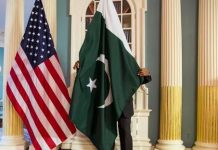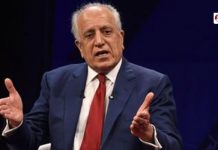The Financial Action Task Force (FATF) said on Friday that Pakistan will continue to remain on its “increased monitoring list”, or grey list, till it addresses the final item on the original action plan agreed in June 2018, and all the points in the parallel action plan handed out to Pakistan by FATF’s regional partner – the Asia Pacific Group (APG).
FATF President Dr. Marcus Pleyer announced the decision on Friday in a virtual press conference after the watchdog’s five-day plenary meeting. “Pakistan has made significant progress and it has largely addressed 26 out of 27 items on the action plan it first committed to in June 2018.”
He said that a single item in the original action plan, which concerns “investigation and prosecution of senior leaders and commanders of UN-designated terror groups”, still needs to be addressed.
“Back in 2019, FATF regional partner, the Asia Pacific Group (APG), identified a number of serious issues during its assessment of Pakistan’s entire anti-money laundering and counter-terrorist financing system. Since then Pakistan has made improvements. This includes clear efforts to raise awareness in the private sector to money laundering risks and to develop and use financial intelligence to build cases”, Pleyer said.
The FATF chief said that Pakistan was still failing to” effectively implement the global FATF standards” across several areas. “This means risks of money laundering remain high which in turn can fuel corruption and organized crime. That is why the FATF has worked with the Pakistan government to work on areas that need to be improved as part of the new action plan that largely focuses on money laundering risks. This includes increasing the number of investigations and prosecutions and making sure that law enforcement agencies cooperate internationally to trace, freeze and confiscate assets”, he said.
When asked about a new plan for Pakistan after the APG evaluation, Pleyer said that the plan had six points, including “enhancing international cooperation and demonstrating that assistance is being sought from foreign countries in implementing UN Security Council designations.”
Pleyer said that all the points in both of the action plans need to be addressed for Pakistan to exit the FATF grey list. He said that even after the final item on the original 2018 action plan is addressed, Pakistan will not be delisted as all the points in the parallel APG evaluation have not been fulfilled.
“As soon as this last remaining item of the [original] action plan is largely addressed, the members will decide whether they will grant an onsite [assessment] for this action plan. Usually once an onsite [assessment] has been successfully completed, the membership can decide on delisting a country.
“But in this case, we have a parallel action plan with all the action items in the second action plan. Then Pakistan must also largely complete all the items on this action plan and then there will be a separate onsite [assessment] to decide on this action plan.
“So the delisting will not occur before both action plans are completed and two onsite [assessments] have been granted and successfully completed and have shown that the improvements are sustainable before the FATF members decide on delisting,” Player said
The Pakistani government was not satisfied with FATF’s announcement. Foreign Minister Shah Mahmud Qureshi said that there is no justification for keeping Pakistan on the grey list.
“We had been given 27 points in the FATF Action Plan, out of which work on 26 has been completed”, he said, adding that work was being carried out to complete the final item on the list. Qureshi blamed that India wanted to use FATF for its political purposes, and cautioned that it must not be allowed to do so.
Dr. Marcus Pleyer was asked a similar question in the virtual press conference earlier, that if it would be discouraging for other countries observe despite the significant progress, Pakistan was still being placed in the grey list.
“Our rules and procedures are very clear. All deficiencies must be addressed and it would also be discouraging if other countries fully address all their action plan items and then got off the list, and some countries got off the list before they have completed all the action items. So the expectation is clear, we treat all countries equally”, he said, thus forestalling Qureshi’s subsequent accusation.





























